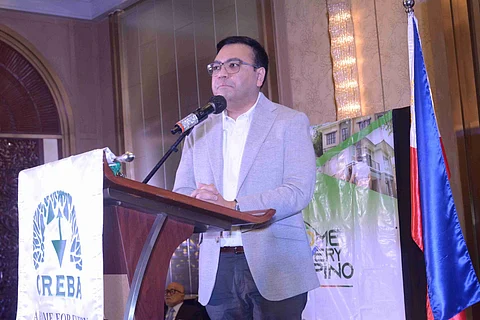
- NEWS
- the EDIT
- COMMENTARY
- BUSINESS
- LIFE
- SHOW
- ACTION
- GLOBAL GOALS
- SNAPS
- DYARYO TIRADA
- MORE

Housing Secretary Jose Ramon P. Aliling said developer-members of the Chamber of Real Estate and Builders’ Associations, Inc. (CREBA) have pledged around 251,000 housing units under the expanded Pambansang Pabahay Para sa Pilipino program (E4PH).
Aliling, who assumed leadership of the Department of Human Settlements and Urban Development (DHSUD) on 29 May, said the commitment reflects renewed enthusiasm following reforms introduced at the start of his term.
Speaking at CREBA’s 5th general membership meeting on 31 July, Aliling unveiled his eight-point agenda to meet housing targets by 2028, emphasizing a commitment to “competence and integrity in the service.”
He also vowed to restore “the credibility, respectability and service quality of DHSUD and its attached agencies.”
Aliling said the original 4PH program focused on vertical housing, such as socialized condominiums, but E4PH now includes horizontal housing, lot-only packages, rental housing, community mortgage, and usufruct.
All E4PH modalities use an incremental housing approach, allowing beneficiaries to acquire basic units they can afford and later upgrade with financing from the Pag-IBIG Fund.
DHSUD Department Order No. 2025-021 established a “beneficiary-centric” and “financing-enhanced” framework to improve affordability and let homebuyers choose housing suited to their needs and capacity.
With these reforms, Aliling said, developers participating in the program should be able to come up with a menu of various packages tailored to homebuyer affordability and preferences.
Under E4PH, Pag-IBIG loans offer 3% interest for up to 10 years. Qualified beneficiaries are from the 7th income decile and below — those earning under P34,600 outside Metro Manila and P42,600 within the capital region.
Aliling said DHSUD has eliminated several requirements that previously stalled developer participation and opened doors for corruption.
These “hold points” contributed to the failure of 4PH to take off, even as these provided opportunities for corruption, Aliling said.
Now, developers only need to meet Batas Pambansa 220 standards and secure a License to Sell for socialized housing, regardless of the chosen modality.
Alliling voiced confidence that participating developers will not take advantage of the program liberalization measures, but nonetheless urged them not to shortchange homebuyers.
Aliling revealed that he inherited a backlog of 3,000 pending items across central and regional offices. That number is now down to 1,700 and is expected to be cleared in two to three weeks.
He said DHSUD is streamlining regulatory processes and shifting to full digitalization before the administration ends in 2028.
